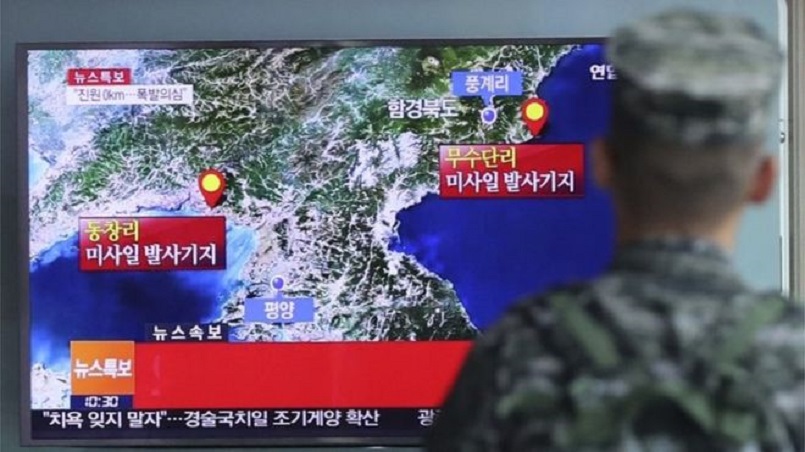
North Korea is believed to have carried out its fifth and largest ever test of a nuclear device, South Korean military officials say.
South Korean President Park Geun-hye called it an act of "self-destruction" which showed the "maniacal recklessness" of leader Kim Jong-un.
It was detected as a 5.3 magnitude quake close to the nuclear test site.
The North has not commented, but analysts fear this could be a sign of the rogue state's nuclear progress.
Previous artificial earthquakes in the same area and of that magnitude have all been nuclear tests.
Ms Park, who is cutting short an overseas visit, said that with a fifth nuclear test "Kim Jong-un's regime will only earn more sanctions and isolation".
"Such provocation will further accelerate its path to self-destruction."
In a statement carried by the Yonhap news agency, South Korea's Joint Chiefs of Staff said: "We estimate the North has carried out the biggest-ever test."
It said the yield was estimated to have been 10 kilotonnes, almost twice the power of its last test in January. At that time the North said it had successfully tested a hydrogen bomb, but many analysts cast doubt on that claim.
The US Geological Survey, which monitors global seismic activity, said earlier that a tremor had been detected in the Punggye-ri nuclear test site in the north-east.
It said it was caused by "an explosion" but could not say what type.
Recent satellite imagery has shown increased activity at the site, indicating a fifth test could be imminent.
Friday is also North Korea's National Day, which celebrates the founding of the current regime. The North often uses such events as an opportunity for a show of military strength.
Japan was swift to condemn the suspected test with Prime Minister Shinzo Abe saying it was closely co-ordinating with its allies.
"If North Korea has conducted a nuclear experiment, we absolutely cannot condone it. We must protest adamantly."
The US has said it is monitoring the reports.
Missile tests and angry rhetoric
North Korea is banned by UN sanctions from any tests of nuclear or missile technology.
But in recent months it has conducted a series of ballistic missile launches and unleashed a rising tide of aggressive rhetoric, threatening nuclear attacks on its enemies.
The North has also been angered by a US and South Korean plan to install an anti-missile defence system in the South and by the allies' annual joint military exercises.
International sanctions were considerably toughened in response to its previous nuclear and missile tests, but had little impact on Pyongyang's determination to be a nuclear-armed state.
